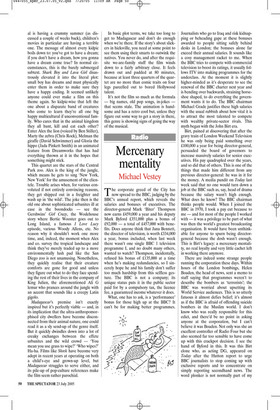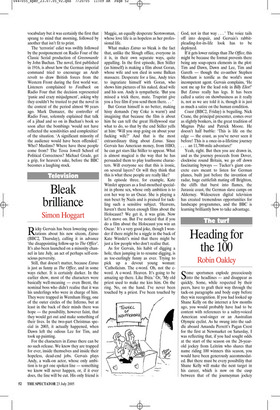Mercenary mentality
Michael Vestey
The corporate greed of the City has now spread to the BBC, judging by the BBC’s annual report, which reveals the salaries and bonuses of executives. The director-general Mark ‘Biter’ Thompson now earns £459,000 a year and his deputy Mark Byford £351,000 plus a bonus of £92,000 — a total of £457,000 with benefits. Does anyone think that Jana Bennett, the director of television, is worth £334,000 a year, bonus included, when last week there wasn’t one single BBC 1 television programme I, and no doubt many others, wanted to watch? Thompson, incidentally, refused his bonus of £135,000 at a time when he’s making redundancies, so I sincerely hope he and his family don’t suffer too much hardship from this selfless gesture. The BBC is not a company; its unique status puts it in the public sector paid for by a compulsory tax, the licence fee, a guaranteed income whatever it does.
What, one has to ask, is a ‘performance’ bonus for those high up at the BBC? It can’t be for making better programmes. Journalists who go to Iraq and risk kidnapping or beheading gape at these bonuses awarded to people sitting safely behind desks in London; the bonuses alone far exceed their annual salaries. It sounds like a cosy management racket to me. When the BBC tries to compete with commercial television to boost its ratings, it usually follows ITV into making programmes for the underclass. At the moment it is slightly higher-minded as it’s desperate to see the renewal of the BBC charter next year and is bending over backwards, straining horseshoe shaped, to do everything the government wants it to do. The BBC chairman Michael Grade justifies these high salaries with the usual rubbish about how vital it is to attract the most talented to compete with wealthy private-sector rivals. This myth began with the John Birt era.
Birt, pained at discovering that after the gravy train of London Weekend Television he was only being paid something over £100,000 a year for being director-general, persuaded the board of governors to increase massively salaries for senior executives. His pay quadrupled over the years, and so did that of others. This is one of the things that made him different from any previous director-general: he was in it for the money. A media pundit on Today last week said that no one would turn down a job at the BBC such as, say, head of drama because the salary wasn’t high enough. What does he know? The BBC chairman thinks people would. When I joined the BBC in 1970, I took a pay cut because to me — and for most of the people I worked with — it was a privilege to be part of what was then the world’s greatest broadcasting organisation. It would have been unthinkable for anyone to spurn being directorgeneral because the dosh wasn’t enough. This is Birt’s legacy: a mercenary mentality, no real loyalty and very little cachet left in working there anymore.
There are indeed some strange people running the corporation these days. Within hours of the London bombings, Helen Boaden, the head of news, sent a memo to staff saying that programmes weren’t to describe the bombers as ‘terrorists’; the BBC was worried about upsetting its World Service audiences. This is so utterly fatuous it almost defies belief; it’s almost as if the BBC is afraid of offending suicide bombers in the Muslim world. I don’t know who was really responsible for this edict, and there’d be no point in asking anyone at the corporation, but I can’t believe it was Boaden. Not only was she an excellent controller of Radio Four but she also seemed far too sensible to have come up with this crackpot decision. I see the hand of Byford in this. It was this Birt clone who, as acting DG, appeared on Today after the Hutton report to urge BBC journalists to stop coming up with exclusive reports and to concentrate on simply reporting secondhand news. The word plonker is not normally part of my vocabulary but it was certainly the first that sprang to mind that morning, followed by another that isn’t fit to print.
The ‘terrorist’ edict was swiftly followed by the postponement on Radio Four of the Classic Serial production of Greenmantle by John Buchan. The novel, first published in 1916, is about how the German imperial command tried to encourage an Arab revolt to draw British forces from the Western Front during the first world war. Listeners complained to Feedback on Radio Four that the decision represented ‘panic and crazy misjudgment’, asking why they couldn’t be trusted to put the novel in the context of the period almost 90 years ago. Mark Damazer, the controller of Radio Four, solemnly explained that talk of a jihad and so on in Buchan’s book so soon after the bombings ‘would not have reflected the sensitivities and complexities’ of the situation. ‘A significant minority of the audience would have been offended.’ Who? Muslims? Where have these people come from? The Tessa Jowell School of Political Correctness? Michael Grade, get a grip, for heaven’s sake, before the BBC becomes a laughing stock.
















































 Previous page
Previous page